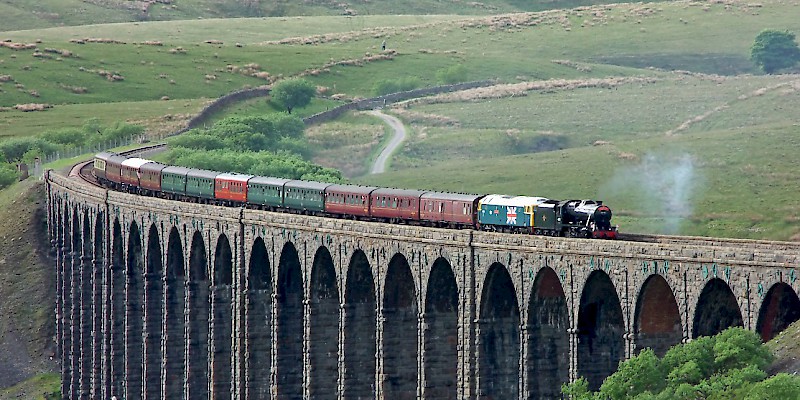Top 12 train tips

Crossing the Ribblehead Viaduct
A cheat-sheet of the most important things to know when riding the British rails
- Booking in advance can save you big money. "Advance" tickets cost remarkably less than "Off-Peak" (travel weekends or after 9:30am weekdays) or "Anytime" tickets. » more
- Most train stations in the U.K. now have automated ticketing machines. These use touch-screens, have an English-language option, are intuitive, make perusing all your options easy, and accept cash (pounds) and credit cards. Failing that, there's always the ticket window, though lines can be long.
- Always travel second class. The first class cars don't get there any faster; all they do is provide a teensy bit more seat padding—but at 20%–30% increase in price.
- Railpasses. If you plan to do a lot of train travel in the U.K., and want the ability to travel before 9:30am weekdays (Peak hours) and buy tickets at the last-minute, a Britrail pass can make a lot of sense. » more
- Train or car? This is the big question. When is a rental car better than a train? A rental car will always give you more leeway to explore—but comes with extra expense and the headaches of driving and navigating. A single person will almost always find it cheaper to ride the rails. Two to three people, it about breaks even, cost-wise. For four people traveling together, a rental car will usually be cheaper overall—though if you are only planning on visiting a few major centers well-connected by rail, it might still be simpler just to take trains.
- Keep your bags nearby. Never check luggage (bothersome and time-consuming), and avoid putting your bags in those luggage racks near the ends of the train cars. Stow them over your seat (or in your lap, if necessary), and take a second to snap one of the bag's straps around the storage area railing—to keep a potential thief from snatching your bag. If you pack light, your luggage will never be too big to stow at your seat.
- Overnight trains are a great way of saving both time and money: Covering vast distances without wasting precious daylight hours on sheer travel, and spending for your night's lodging only £35–£38 ($44–$48) per person for a bunk in a two-person shared sleeping berth, or £43–£60 ($54–$75) for a solo berth. This will not be the most comfortable night's sleep you'll ever have, but it's a great time– and money-saver. » more
- Pack a picnic. Food on board British trains is overpriced and underwhelming. Same goes fro the often uninspired grub available in the station—though a sandwich from a Prèt A Manger kiosk will still be better than what you can get on board, should you fail to arrive at the station with picnic pickings.
- Don't drink the water on trains, not even to rinse your mouth. It's greywater meant for hand washing only. This is a bit frustrating, since trains—especially overnight trains—dehydrate you quickly. So make sure you bring bottled water to sip throughout the ride and also to rinse out your mouth (and your toothbrush) after an overnight train ride.
- Discounts for youths, seniors, couples, families, and the handicapped. British train tickets are already discounted 50% to children aged 5 to 15 (kids under 5 are free). Anyone aged 16–25, over 60, couples, families, and the disabled can buy a £30 railcard (£20 for the handicapped) that will get you 33% off all train tickets for one year. » more
- Use train time to plan. I usually start any train journey by catching up on my journal, but then I turn to the next stage of my trip and prepare for the next destination. I flip through my guidebooks and start ranking likely places to stay, working out what I want to see and do, and roughing out an itinerary.
- (Don't) hop on the bus, Gus. Explanative disclaimer: Buses do, indeed, have to do with train travel in that the trains are better. OK, that's a bit of specious reasoning, but this bit didn't fit well anywhere else and it is germane to the discussion of connecting the dots on a British itinerary. With rare exceptions, an inter-city coach is not going to be any cheaper than the train or a no-frills airline. It will only (a) take longer, and (b) be less comfortable. (This particularly goes for the London-Edinburgh route; the Caledonian Sleeper train is lovely; the overnight coach is hell on wheels.) These are not bonus factors when considering your options. Coaches—in British English, a "bus" operates within a city, a "coach" between towns; use those terms to help avoid confusion in Europe as many Europeans learn a more British form of our lingo—are really only useful for getting to places where the trains don't go. Then again, these sorts of places—ones literally off the beaten (train) track—can make excellent destination. » more






